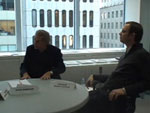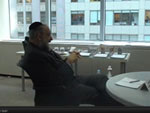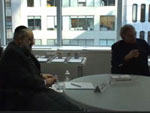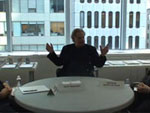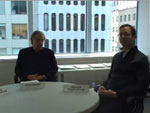David Birnbaum: Where did God come from? Why is there evil? Where are we going? You can keep it simple you actually hold everyone to a relatively objective standard. Once you start getting fancy which I view as like an ultimate academic disease in the field of metaphysics, you enter another world of definition what is reality, what is knowledge, what is anything, why are we doing anything and at least basically you think you are ending up somewhere but you end up going nowhere.
Lawrence Schiffman: But here is an interesting fact which is that the Jewish studies – study of Jewish thought as for that reason separated itself from what the philosophy department school doing philosophy and the reason for that is because I think of the feeling of sort of helplessness in light of the fact that you are not going to get answers to these things and therefore the so-called thought by which I mean like when we say Jewish thought just becomes well what do I think. I have a lot of ideas and not necessarily discipline. Hopefully most of them are right, so let me just say that, and very often they are very inspiring and very good ideas, but that’s what now poses for Jewish thought of philosophy because of the fact that ultimately it covers up the inability to answer questions besides this whole modernization, and I think after the holocaust it’s especially true because giving your simplistic answers we have people who admit, but I always support [inaudible 01:22] said that we would never ever have a way to understand holocaust because just no matter what when I hear that [inaudible 01:30] this suffering. You and your book with that story I mean how could anybody fathom any of this, and I think that that’s another thing which is kind of realistic view in a certain sense of Jewish thoughts as I look at we have a choice but then we don’t want. But I wanted to ask you a question now which is about definitions because I am not Jewish when you say the cause that you being the same thing that I would mean.
David Birnbaum: What do you mean by cause?
Lawrence Schiffman: The cause, when you say for example that we want to — the cause of this or the cause of that in particular case the cause of God.
David Birnbaum: I don’t use the word cause at all.
Male: No, you used the word in the conversation.
David Birnbaum: The word was origin.
Male: Now what do you mean origins?
David Birnbaum: The origins. Well, if you ask [inaudible 02:08] what would they say the word origins means the beginning of God, the very beginning of God.
Lawrence Schiffman: Okay, so he said then you get into these problems because if God is this potential so I hate to say this but by definition potential exists because it hasn’t come into reality –
David Birnbaum: Right, that’s why I said but –
Lawrence Schiffman: Therefore it existed, it’s eternal. So therefore you are back to the same simple fact that it has no cause, it’s God. If God is that aspect the core right which sounds very Kabbalistic actually I mean we’ve spoken about this before in fact in the first volume you trace all little sources and allude again in the second volume which is us. But the point I am making is that it starts with sometimes core thing which is God also starts to come close to two other interesting —
David Birnbaum: No I say the core thing which I call Quest for Potential.
Lawrence Schiffman: Right, but that’s the core of what becomes, when you say becomes God you are talking about the things what we describe. In other words, you are not talking about God because God’s core remains what God is. So we see [inaudible 03:14] we say God is liberated, we say God does this, we say — Now then so when you get finished to some extent you are back to the questions of the essence versus attributes and this is essence, and everything else is attributes, in which case if you can’t speak about origin, it’s the core thing which you just talk about because it is still at the time.
David Birnbaum: Fine, so therefore okay, the question is which is more elegant first proposition of metaphysics if I pose to a 1,000 random seven year olds around the planet? Is it more elegant to say that potential always existed or is it more elegant to say the God of Israel always existed? And my — I would humbly submit, I will submit that most of the random seven year olds would say it’s more elegant to say potential always existed and therefore just like young kids would tell us what the letter is, avoid the fancy players, the fancy discussion. But now you must remember that I write Summa Metaphysica which can be read — I am very clear about it, more so about the second book, you can view Summa Metaphysica through a religious lens or through a non-religious lens. You can have Summa Metaphysica with God or God of Israel or you have Summa Metaphysica without the face of God of Israel but however my schema whether it’s a religious perspective or separate perspective we are all part of an infinite divine. Now this also is [inaudible 04:46], but because that’s right ahead, now is this infinite divine the God of Israel or it’s not the God of Israel? Well I personally would tilt towards the God of Israel, but that’s a personal opinion. that’s not my academic position. My academic position is you can take either approach and either approach would basically work because I am subjective. I grew up in a modern orthodox home. It’s hard for me to disentangle what part of it is my heart, what part is my [inaudible 05:13]. And therefore the nice part of it is it seems to work whether you approach it from a religious perspective or a non-religious perspective and as far as the God of Israel exact origins where Quest of Potential starts, where the God of Israel [inaudible 05:30] that’s room for 1,000-10,000 summits. Summa Metaphysica does not rise or fall on where Quest for potential starts where the God of Israel ends, there is room to maneuver. As we both know, as we all know, I am doing very rough brushstrokes, but I feel very elegant enough brushstrokes to advance the equation. Now yes you know I agree but I would take a step further, not you see how it’s true Jewish philosophy and probably regular philosophy has basically given up, that probably doesn’t say it’s given up, it makes believe that it’s not given up, that’s the real problem.
Lawrence Schiffman: It’s more fun.
David Birnbaum: It makes us believe that we have a solid answer and you silly 18-year-old or spoiled brat iPhone 22 year olds just are not paying attention if [inaudible 06:17]. The reality is they have given up. Now I say don’t give up, I am all for unified metaphysics. It might be wrong, it might be right, but you know what it looks like a unified elegant metaphysics, I have to think it’s right, basically right. That’s why I spent two decades tinkering with it. But you want to say it’s not right, fine, but what are you trying to pose it against, where is option B. I am not aware of option B, I am not aware of an Yale, I am not aware of an [inaudible 6:47], I am not aware of where option B is.
Lawrence Schiffman: Okay. The truth of the matter is if I started to after – actually I don’t have enough expertise to do this, correct?
David Birnbaum: You have enough expertise, that’s the point, you do have enough expertise.
Lawrence Schiffman: Not on what I am about to say. If I select a name, diseases that are not being researched right now, right, basically the things that are known that should be worked on —
David Birnbaum: Watch how he shifts the discussion. Watch how he tries to shift the discussion.
Lawrence Schiffman: Like medical research, right, you will see the same things.
David Birnbaum: It’s irrelevant.
Lawrence Schiffman: No, no it’s not irrelevant. I think there are fundamental reasons for a lot of these factors. One of the most fundamental is the rise of what some form of existentialism, which may or may not really be a existentialism, the [inaudible 07:42] know what it is, meaning religious approaches in which what is key is my experience, once my experience becomes key, I can say look, I don’t really know exactly why it works this way, but I don’t need to know and since I see that all these people we try to write that Rousseff [ph] I couldn’t understand, or didn’t get to any, or not that many people seem to be interested, I said look I don’t care about this, my minister or something right sitting in the Fourth Baptist Church or wherever, he said to me listen what you need to do is you need to be able to nurture yourself in a relationship with the divine. Now here is a really interesting fact, I once heard a fantastic lecturer from — Dr. Norman Lamm about this, who’s on the back of your first book, he said there this is a part of me which I cannot and will not reveal to you, and even [inaudible 08:38] that I reveal to nobody, not even to my family. Okay now the point is that that part of that you never reveal is the part of you that the religious system is somehow supposed to be in some relation with God which is not defined by how it would act, is not defined with that guy sitting in a pew with Jew putting on [inaudible 09:00] very interesting. Now because you don’t need to answer these questions, people said look just put this aside, we can’t ask these questions, let’s just have our experience and that will edify us in a genuine way, make us better people, make us understand our place in the world and whereas if I am going to sit around all day discussing all these issues, see I happen to believe by the way that many Jews who survived the holocaust who populated synagogues that we go to, modern orthodox synagogues, take away not really believing in any of the things that they should believe in. In fact I think we once discussed this that those people really should read this book because the book makes it possible to just look at theology in which you don’t ask this out as the problem of evil where it’s potentially solved because humans have that freedom. Now of course that doesn’t satisfy the person with little experience that no matter what you say he isn’t satisfied for good reason. We can’t judge this, but anyhow the point that I am making is I have got a feeling that a lot of these people, [inaudible 10:06] don’t know the answer, they don’t really believe this but it’s the right way to live, and that I think on some level is true about some of these questions and why they have been abandoned.
David Birnbaum: Okay for quick response yes I believe that’s correct, that basically Jewish philosophy has evolved into Jewish homiletics. It’s going to be philosophy I am going to give you this, I will give you the speech what people want. Right so but the fact that that’s what people want and that fact that we are getting it doesn’t mean that it’s metaphysics, it’s not metaphysics, it’s not philosophy, it’s, homiletics, it’s a speech and it’s rabbinic speech or a clerical speech. As far as the holocaust survivors, I gave a [inaudible 10:44] 95th street on the upper Westside Manhattan and in the front two rows were two rows of survivors of Bergen-Belsen and I will tell you I was very tense giving my speech as I myself did not know how this would go off. I don’t know if they would be angry with me, they would come over and slap my face afterwards I did not know, and to my shock they came over me and hugged me, why is that. Well interesting enough the work that seems so unemotional on some level gives meaning to the alliance. Point of this was the possibility for evil twined with the possibility for good on some level ignites creation and that if there was no holocaust or things like as terrible as holocaust there could have been no creation. So on some level although some of the death defying nature of work, the holocaust, possibly the holocaust ignites creation, and on some level this terrible suffering none of us want to go anywhere near that suffering individually. On some level this suffering ignites creation retroactively, and this is the best we can do, but it turns out the best we can do was sufficient for this particular group, and again to my shock, they were crying and I was crying. So that was more simple but it was reality. Okay let me turn the table over to yourself now.
Micah Gottlieb: Well I just have one — there is another kind of insight for one more comment that struck me, and that was that really there is a really deep sense in which I see your work as a kind of culmination or outcome of enlightenment but especially in the context of American context. It’s only deeply American about this metaphysics.
David Birnbaum: Fair enough, fair enough. You know American movies have happy endings, European movies have sad endings.
For David Birnbaum philosophy, metaphysics, see also Hawking2000
